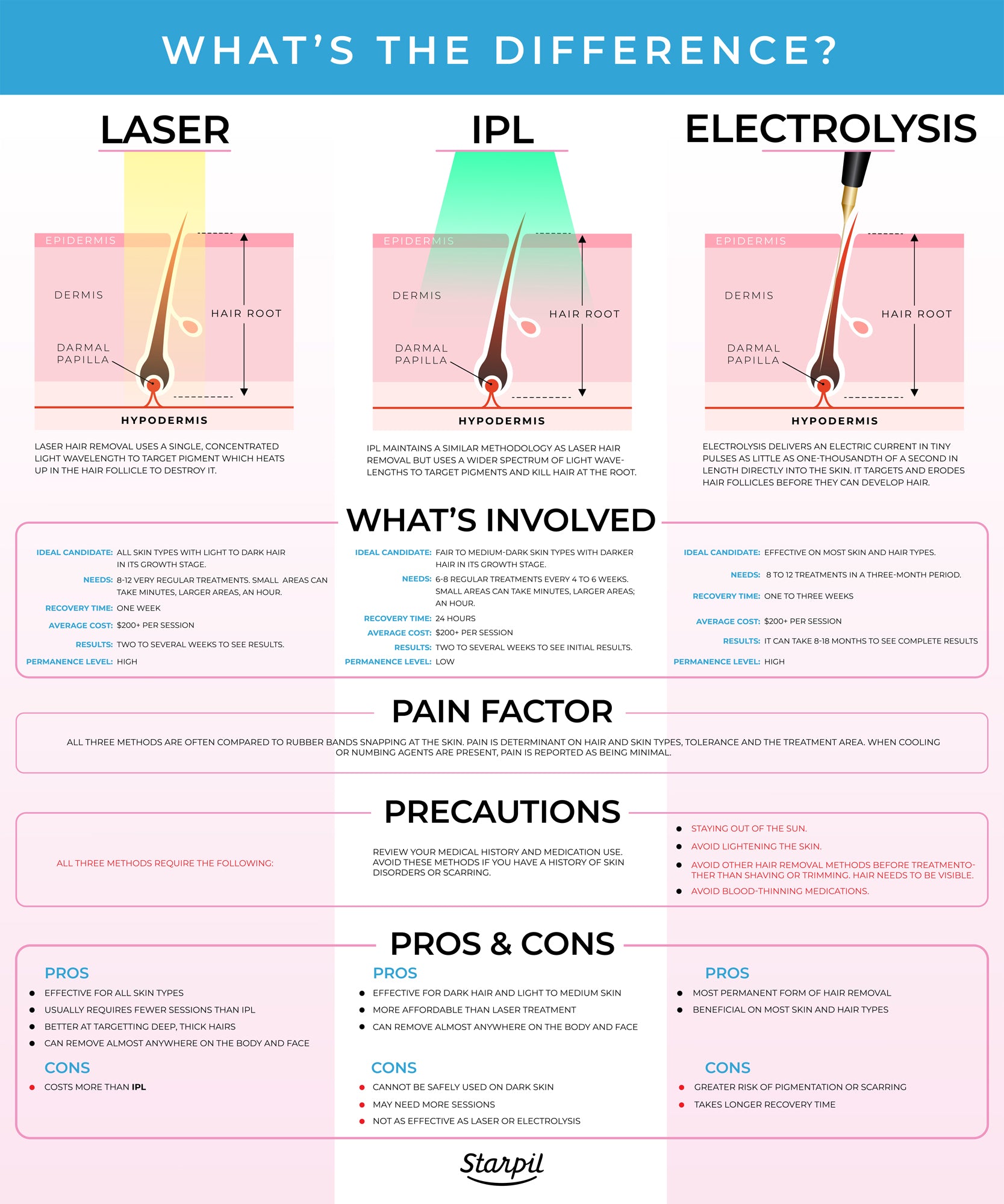Table Of Content

Laser hair removal is usually safe, even in sensitive areas such as the groin. If the hairs do not go away unaided, a person may want to try laser treatment after their pregnancy. Doctors may ask them to wait a few weeks after giving birth before they have the treatment.
Risks and Side Effects of Laser Hair Removal
Overall, while laser hair removal is generally considered safe, professionals take various precautions to minimize the risk of skin cancer. It's crucial for individuals considering laser hair removal to consult with a qualified professional and follow all safety guidelines to ensure the best possible outcome and minimize any potential risks. In conclusion, the laser used in hair removal treatments is unlikely to cause DNA damage in skin cells that could potentially lead to skin cancer. The wavelengths of light used in laser hair removal are carefully selected to target the hair follicles while sparing the surrounding skin tissue.
Can laser hair removal cause skin cancer?
If your face was treated, you can wear makeup the next day unless your skin is blistered. Avoid direct sunlight, tanning beds, sun lamps, or any kind of indoor tanning equipment. The technician may give you ice packs, anti-inflammatory creams or lotions, or cold water to ease any discomfort. Lasers are useful for removing unwanted hair from the face, leg, chin, back, arm, underarm, bikini line, and other areas. However, you can't get laser done on your eyelids or the surrounding areas or anywhere that has been tattooed.
Empowering natural barrier function for future-proof skin
Rarely, laser hair removal can cause blistering, crusting, scarring or other changes in skin texture. Other rare side effects include graying of treated hair or excessive hair growth around treated areas, particularly on darker skin. The relative radiant exposure and wavelengths of IPL systems are outside the parameters of the widely accepted photochemical mode of action of inducing carcinogenic effects [3, 16].
Study points to cancer risk from laser hair removal
One of the most common side effects of IPL treatments is a slight redness in the treated area. This is primarily due to the continuous exposure to heat during the procedure, which can cause minor skin damage similar to a light burn. However, this side effect is usually temporary and can be easily managed.
Does Laser Hair Removal Cause Cancer in the Skin
Laser hair removal is a procedure that uses a laser, or a concentrated beam of light, to get rid of hair in different areas of the body. Overall irritation should disappear within hours of the procedure. You should call your doctor if you experience symptoms beyond slight irritation or if the side effects worsen. Excessive hair growth during pregnancy is typically temporary and often resolves on its own postpartum. Occasionally, laser hair removal can cause changes in the texture of the skin, particularly if you have recently tanned. If you notice unexpected hair growth, it is advisable to consult your doctor or provider for further evaluation.

On areas of slow hair growth, such as the back, the treatment might be every 12 to 16 weeks. Upon reviewing a broad range of literature, a conclusion has been drawn that if a dermal melanoma is treated, there will be no photochemical reaction as typical IPL wavelength outputs are not capable of doing so. Melanomas will absorb the IPL wavelengths superficially converting to heat; it is possible this will kill cells in the top layer, and it will continue to develop as it would have done without IPL treatment. Unfortunately, Sorg et al. did not undertake any dose-ranging studies for either UV-A or IPL irradiation, only relying on a single data point for each wavelength range.
Addressing Concerns: Laser Hair Removal Risks vs. Cancer
Overall, laser hair removal is a safe and effective procedure when conducted by a qualified professional. However, as with any medical treatment, there are potential risks and side effects that should be taken into consideration. By understanding these risks and taking steps to minimize them, patients can enjoy the benefits of laser hair removal without compromising their health. While laser hair removal itself does not increase the risk of skin cancer, it is important to note that the procedure can leave the skin more vulnerable to sun damage. This is why it is recommended to avoid sun exposure and wear sunscreen after undergoing laser hair removal. The core of this method lies in its use of a hair removal device that emits pulsed light energy.
See your doctor if any rare symptoms occur after laser hair treatments. After laser treatment, you may notice slightly darker or lighter skin. If you have light skin, you’re more likely to have darker spots from laser hair removal. The opposite is true of people with dark skin, who may have lighter spots from the procedure.
If you are having a large area like the back or legs treated, your treatment may last more than an hour. To help you decide whether this treatment is right for you, you should review the following facts. Reporting symptoms early allows for quick treatment and may help prevent any permanent changes.
Bleaching skin and hair: Yay or nay? - Health shots
Bleaching skin and hair: Yay or nay?.
Posted: Mon, 23 Oct 2023 07:00:00 GMT [source]
Salons, clinics, and medical spas across the world now offer laser hair removal as a standard cosmetic treatment. If you experience any of these side effects after laser hair removal, it is important to seek medical attention. Your healthcare provider can help to manage your symptoms and prevent further complications. You might need maintenance laser treatments for long-term hair reduction. If you have a skin reaction immediately after laser hair removal, the doctor might apply a steroid cream to the affected area. Common treatment locations include legs, armpits, upper lip, chin and the bikini line.
However, concerns have been raised about the safety of this procedure and whether it is linked to an increased risk of developing skin cancer. One of the most common myths surrounding laser hair removal is that it can cause cancer. While some people may experience minor side effects from the procedure, such as redness, swelling, or blistering, these are typically short-lived and not a cause for concern. Laser hair removal is a popular cosmetic procedure that uses concentrated beams of light to remove unwanted hair.
When there is a marked decrease in the number of thick, coarse hairs in the area of treatment for a period longer than the complete hair growth cycle, the results are considered permanent. People with thick, dark hair, light skin, and normal hormonal status are more likely to see permanent results. 5) Once the laser is in position, the medical provider will emit laser pulses to vaporize the hair follicles. Laser pulses typically feel like a rubber band being snapped against the skin or like warm pinpricks. The procedure has been shown to be ineffective for thin, fine hairs (or peach fuzz), and hairs that are white, grey, or red.


No comments:
Post a Comment